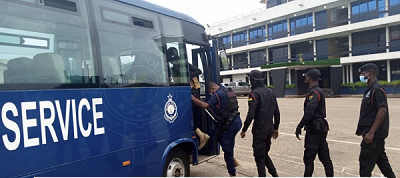Editorial
Police shuttle service better late than never

Shuttle services are not entirely new but I am particularly impressed about the recent move by the Ghana Police Administration to provide buses on specific routes in Accra to convey personnel to and from their duty points.
Even as a young boy, I used to enjoy this service provided by my school. That is why I wonder why it took the police service a long time to make this essential service available to its men and women.
According to the service, the programme had been implemented in 15 out of the 18 Police Operational Regions and was intended to “ease the burden of commuting of officers and ensure that personnel who carry weapons for duty, do so under safe conditions.”
This initiative, which I believe, was spearheaded by the Welfare Unit of the police administration, is not only a relief to the officers but a boost to the performance and morale of the gallant men and women of the service.
While I commend the service for this step, I urge the police administration to as well address other pressing concerns of personnel, such as provision of decent and affordable housing, supply of adequate bulletproof vests and needed logistics to help combat crime and protect lives and property.
I again urge leadership to extend the shuttle service to the remaining three Police Operational Regions as it puts measures in place to sustain the service.
Frank Twum,
Sakumono.
Fix drains at Weija – Gbawe
Dear Editor,
The relatively low volume of rain recorded in Accra recently has exposed the cracks in the drainage system in the Weija – Gbawe Municipality.
Few hours of rain last Tuesday caused flooding in parts of the community leaving some residents stranded and some major roads immotorable.
Residents have attributed constant flooding in the area to choked and malfunctioning drainage systems. I, therefore, wish to use this medium to, once again, highlight this challenge and draw the attention of authorities in the area to as a matter of urgency move and resolve this challenge.
Weija is the capital of the Ga-South Municipality which has gradually become an economic hub due to its proximity to Kasoa, therefore, the least disruption caused by floods tends to adversely affect lives and property.
Sandra N.A Attom,
Student, African University College of Communications
Editorial
Build fairer educational system after double-track
Dear Editor,
THE Ghana Education Service (GES) has announced that most Senior High Schools (SHSs) will return to the single-track system by this month.
For many students and parents, this feels like a relief. But before we move on, we must take a moment to reflect.
The double-track system helped thousands of students get into schools. It gave hope to families who couldn’t afford private education. But it also came with challenges.
Some students had shorter terms, others had longer breaks. Teachers were stretched, and learning felt rushed. Many students felt left behind not because they didn’t try, but because the system didn’t give them enough time.
Now that we’re returning to single-track, let’s make sure we don’t repeat the mistakes of the past. We need more classrooms, better planning, and support for teachers.
Education is not just about getting into school. It’s about feeling safe and supported. Let’s build a system that gives every child a real chance.
Beatrice Princess Kpeglah,
Dansoman
Join our WhatsApp Channel now!
https://whatsapp.com/channel/0029VbBElzjInlqHhl1aTU27

Editorial
Let’s embrace environmental conservation
Dear Editor
As it is critical for preserving our surroundings, there is the urgent need for increased awareness and action to protect Ghana’s environment and resources.
Ghana’s forest reserves, vast savannas and scenic coastlines serve as homes and habitats to a wide range of flora and fauna, including several endangered species.
Our vegetation and rich soil deposits provide the nation with food, plants and animal resources, which ensures food availability and accessibility for the population.
However, the country’s environment is facing numerous threats including deforestation, overexploitation, pollution, etc.
The importance of environmental conservation cannot be overstated; our natural resources are the backbone of our economy, playing a vital role in driving the country’s economic growth and development.
It is therefore critical that we take actions to protect them for our future generations.
There is the need for collective action to address environmental challenges and promote sustainable development.
Environmentalists, various organizations and private individuals must come on board to promote environmental conservation, through tree planting exercises, clean-up campaigns, and resource conservation practices.
These efforts, when carried out effectively, would create a long-lasting impact in protecting and conserving the country’s environment.
The Ghanaian government should also implement policies and conduct regular programmes aimed at promoting environmental conservation.
By Theresa Tsetse Dzifa,
Bubiashie






